|
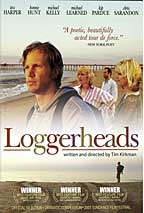
Loggerheads
Strand Releasing,
2005
Screenplay/Director:
Tim Kirkman
Starring:
Kip
Pardue, Bonnie Hunt, Tess Harper, Chris Sarandon, Michael Learned, Michael
Kelly
PG-13, 96 minutes
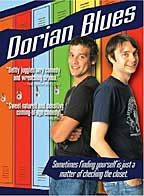
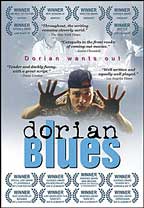
Dorian
Blues
TLA Releasing,
2004
Screenplay/Director:
Tennyson Bardwell
Starring:
Michael
McMillian,
Lea Coco, Steven Charles Fletcher, Mo Quigley
Unrated, 88 minutes
|
Moving
On,
Coming Out
by Michael D. Klemm
Reprinted
from Outcome, April, 2006
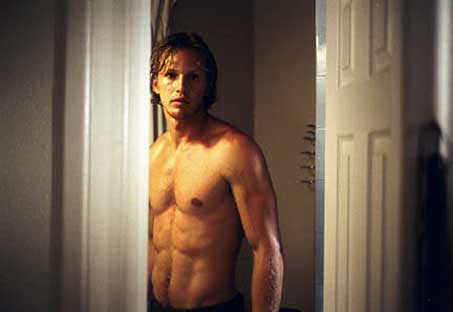
2005 was a very good
year for queer cinema. Brokeback
Mountain, Capote and Transamerica immediately come to mind,
but these weren't the only independent titles that crossed over to mainstream
critical acclaim. The list also includes Gregg Arraki's stunning Mysterious
Skin, (reviewed last fall in Outcome)
and a haunting meditation on familial loss entitled Loggerheads.
|
|
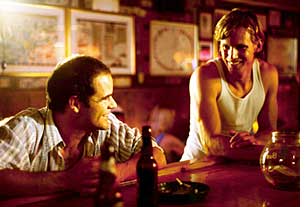 Loggerheads,
written and directed by Tim Kirkman, (Dear Jesse, The
Night Larry Kramer Kissed Me), masterfully weaves three seemingly
unrelated stories into an emotional kaleidoscope. A young drifter named
Mark (Kip Pardue) comes to Kure Beach to observe, and to help save, the
nocturnal Loggerhead turtles. He is also being observed, in turn, by George
(Michael Kelly) during his morning jogs on the beach. George rescues Mark
from being arrested for vagrancy and invites him to stay at his motel. Loggerheads,
written and directed by Tim Kirkman, (Dear Jesse, The
Night Larry Kramer Kissed Me), masterfully weaves three seemingly
unrelated stories into an emotional kaleidoscope. A young drifter named
Mark (Kip Pardue) comes to Kure Beach to observe, and to help save, the
nocturnal Loggerhead turtles. He is also being observed, in turn, by George
(Michael Kelly) during his morning jogs on the beach. George rescues Mark
from being arrested for vagrancy and invites him to stay at his motel.
|
|
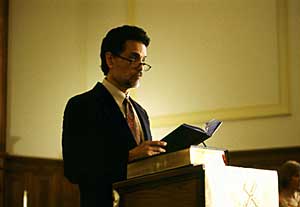 In
nearby Eden, a stern preacher and his wife, Elizabeth, (Chris Sarandon
and Tess Harper), are troubled by the gay couple who has just moved into
the neighborhood with their young son. When Elizabeth asks if she should
invite them to church, her husband says "Let's see if they come on
their own." Their sudden arrival opens old wounds as Elizabeth longs
to re-connect with their estranged son. In the third story, a middle-aged
woman named Grace (Bonny Hunt) has returned home to live with her mother.
Empty and unhappy, she embarks on a search for the son she was forced
to give up for adoption when she was 17. In
nearby Eden, a stern preacher and his wife, Elizabeth, (Chris Sarandon
and Tess Harper), are troubled by the gay couple who has just moved into
the neighborhood with their young son. When Elizabeth asks if she should
invite them to church, her husband says "Let's see if they come on
their own." Their sudden arrival opens old wounds as Elizabeth longs
to re-connect with their estranged son. In the third story, a middle-aged
woman named Grace (Bonny Hunt) has returned home to live with her mother.
Empty and unhappy, she embarks on a search for the son she was forced
to give up for adoption when she was 17.
|
|
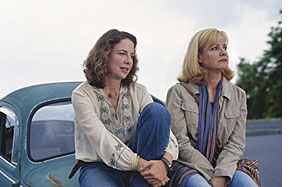 About
midway, astute audiences should realize how the three tales will connect,
and the drama gains in power as the eventual intersection grows near.
In the meantime, it is a pure pleasure to watch these subtle character
studies unfold in sometimes unexpected ways. Mark and George, for example,
do not fall into bed together on their first meeting. We learn that Mark
is HIV+ and ran away from home as a teenager, and that George lost his
lover in a drowning accident (or was it?). Director Kirkman displays a
fine eye for character detail. Watch Elizabeth complain about the large
anatomically correct statue of Michelangelo's David in her neighbor Ruth's
front yard. When she suggests moving it to the backyard "so we don't
have to look at it," Ruth counters with "That's your solution
for everything, isn't it?" About
midway, astute audiences should realize how the three tales will connect,
and the drama gains in power as the eventual intersection grows near.
In the meantime, it is a pure pleasure to watch these subtle character
studies unfold in sometimes unexpected ways. Mark and George, for example,
do not fall into bed together on their first meeting. We learn that Mark
is HIV+ and ran away from home as a teenager, and that George lost his
lover in a drowning accident (or was it?). Director Kirkman displays a
fine eye for character detail. Watch Elizabeth complain about the large
anatomically correct statue of Michelangelo's David in her neighbor Ruth's
front yard. When she suggests moving it to the backyard "so we don't
have to look at it," Ruth counters with "That's your solution
for everything, isn't it?"
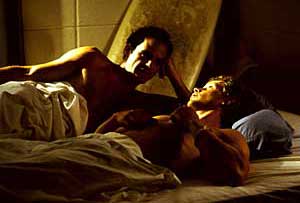 The
film's central metaphor is the loggerhead turtles who return to the same
spot where they were born in order to nest. Meanwhile, parents and offspring
are unable to find each other, and live their lives as empty shells. This
could have been a bad Lifetime TV movie, but the writing is sharp and
the acting is outstanding. Each of the three segments are wonderful stories
in their own right. And it was nice, for a change, to see two gay men
in a movie who are not defined by just sex for a change. The
film's central metaphor is the loggerhead turtles who return to the same
spot where they were born in order to nest. Meanwhile, parents and offspring
are unable to find each other, and live their lives as empty shells. This
could have been a bad Lifetime TV movie, but the writing is sharp and
the acting is outstanding. Each of the three segments are wonderful stories
in their own right. And it was nice, for a change, to see two gay men
in a movie who are not defined by just sex for a change.
The disc sports a
fine director's commentary, interviews and deleted scenes.
|
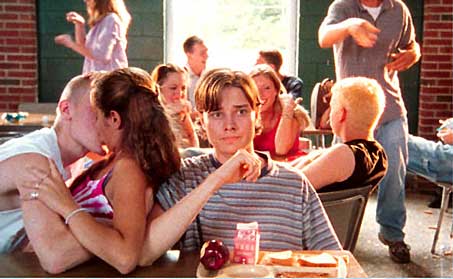 |
|
Just when I thought
I never wanted to see another high school coming out movie, along
comes one that is new and refreshingly different. The film is called Dorian
Blues. Michael McMillan plays Dorian Lagatos, a misfit
teen who declares that he is gay in a hilarious opening montage that recalls
Wes Anderson's Rushmore. Dorian's home life is a nightmare. His
father is a tyrant who entertains no opinions besides his own. Dorian's
star athlete brother is clearly the father's favorite, and his mother
rolls pennies in the kitchen, oblivious to everything.
Dorian has no problem
with being gay but, after sleeping with the school dork, he races home,
brushes his teeth and runs to confession. Turning to his brother Nicky
for help leads to an encounter with a prostitute. The night ends with
Dorian recognizing his pastor's "ex-gay" pamphlets for the pure
bullshit that they are. Coming out to his father is a predictable disaster
and he runs away to college in New York City. Everything isn't roses there
either, but at least he can be himself.
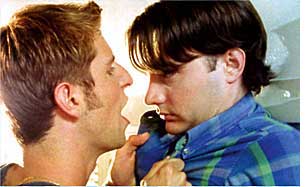 The
comic scenes are endless. Dorian encounters a drunk social worker, is
unable to confront a dummy (representing his father) in a therapist's
office, and listens to the prostitute his brother paid for sing pitch-perfect
Billie Holiday tunes instead of getting horizontal. I almost needed CPR
when he was seduced by the school nerd while dancing to The Monkeys. The
comic scenes are endless. Dorian encounters a drunk social worker, is
unable to confront a dummy (representing his father) in a therapist's
office, and listens to the prostitute his brother paid for sing pitch-perfect
Billie Holiday tunes instead of getting horizontal. I almost needed CPR
when he was seduced by the school nerd while dancing to The Monkeys.
|
|
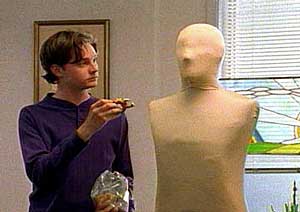 The
sharp script is a delight. When Dorian's brother rescues him from from
a bully, he tells him to stay in the closet and to remember how the Nazis
said that if you tell a lie often enough that people will eventually believe
it. To this sage advice, Dorian replies "So... your advice is that
I be more like Hitler?" The
sharp script is a delight. When Dorian's brother rescues him from from
a bully, he tells him to stay in the closet and to remember how the Nazis
said that if you tell a lie often enough that people will eventually believe
it. To this sage advice, Dorian replies "So... your advice is that
I be more like Hitler?"
Dorian
Blues
is a quirky, offbeat comedy in the vein of Hal Ashby's classic Harold
and Maude, or - to use a more recent example - the strange but oddly
hypnotic Napoleon Dynamite. Like Ashby's film, Dorian
Blues deftly juggles the comic and the tragic. Most of
the film is laugh-out-loud funny, but it also has a big heart. The relationship
between the two brothers is one of the most touching I have seen in any
movie. When Dorian tells Nicky that he is gay, his more popular brother
is on his way to a party but - when Dorian starts to cry - Nicky stops
and says "You really need to talk now, don't you?" and
stays up with him through the night.
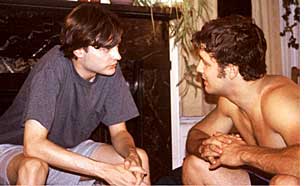 In
each scene, the actors know when to be over-the-top, and when to pull
back for emotional resonance. The cast is perfect. Michael McMillan is
deliciously deadpan as Dorian. And seeing Steven Fletcher, who played
the wife-beating Brad Vernon on the soap opera One Life To Live
back in the late 1970s, as the bigoted father was a hoot. In
each scene, the actors know when to be over-the-top, and when to pull
back for emotional resonance. The cast is perfect. Michael McMillan is
deliciously deadpan as Dorian. And seeing Steven Fletcher, who played
the wife-beating Brad Vernon on the soap opera One Life To Live
back in the late 1970s, as the bigoted father was a hoot.
The fact that writer/director
Tennyson Bardwell is not gay is illuminating. Even though most
straight filmmakers are usually clueless how to depict queer life, this
one's new spin on the old tired coming out formula is the best I've seen
since Edge of
Seventeen. This one is also recommended.
[Reviewer's note 2011:
Michael McMilliam memorably played the smiling, but dangerous, pastor
of the Church of the Sun in the second season of HBO's great homo-erotic
guilty pleasure, True Blood.]
More
On Tim Kirkman
The Night Larry Kramer Kissed Me
|


